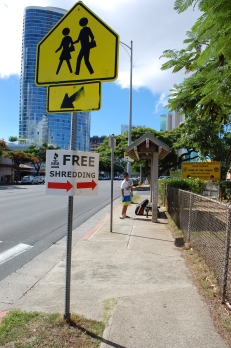 Cars and cars and cars filled with unneeded documents, electronic waste, and old cell phones piled into three locations across the island of Oahu on Saturday, Oct. 20. Drivers were taking advantage of free paper shredding and e-waste disposal offered on “Secure Your ID Day.”
Cars and cars and cars filled with unneeded documents, electronic waste, and old cell phones piled into three locations across the island of Oahu on Saturday, Oct. 20. Drivers were taking advantage of free paper shredding and e-waste disposal offered on “Secure Your ID Day.”
About Secure Your ID Day
First Hawaiian Bank, Access Information Management and Pacific Corporation Solutions were on-site providing their disposal services free of charge at the event hosted by Hawaii’s Better Business Bureau (BBB).
“Last year, we had a little bit short of 700 cars and a little over 14 tons of papers shredded,” says Director of Operations at Hawaii’s BBB Lisa Nakao.
Make it a point to pay close attention to the privacy settings of your social media accounts, says Nakao. For example, many college students have their birth date public on their Facebook, a seemingly innocent act. Unfortunately, not many know that it may just make identity theft easier, as thieves sometimes turn to multiple sources to harvest information.
Another way that young adults in particular are at risk is through their high usage of iPhones and other smartphones. Since there are apps to e-mail, purchase items off eBay, check your PayPal account, and more, a variety of information can be stored on the portable and easily losable device. Locking your iPhone with a password is a relatively good safeguard in the event that it is lost or stolen.
This generation of college students tends to do a lot of online shopping, too. If you are making an online purchase, be sure the site is secure by glancing at the address bar. A secure website will have an https:// or a padlock icon on the left hand side of the web address. E-mail is not a secure way to send credit card information.
Finally, take advantage of the once-yearly free credit report that each individual is entitled to by Federal Law at www.annualcreditreport.com. Keep in mind this is the only official free credit report website backed by the FTC, so do your research on other sources that may be offering free credit reports.
If you notice your bank account becoming inexplicably depleted (among other signs) and you suspect that an identity thief is the culprit, there are a few steps to take. First, contact Equifax, Experian, or Trans-Union, the three major credit bureaus of Hawaii, and place a fraud alert on your account. By contacting one of the major credit bureaus, the other two are automatically notified of the status. Doing so will prevent changes or credit extensions from being made to your account unless the creditor contacts you. Next, close the accounts that have been compromised. Identity theft is a felony in Hawaii, so report the incident to the Honolulu Police Department. Finally, file a complaint with the FTC so they can learn more about how identity theft is occurring and how they can assist victims.
The importance of securing information
Individuals aren’t the only ones who have to be responsible with their information; organizations and businesses also have to monitor personal data that might be on file.
Five data breaches within the University of Hawai’i (UH) system occurred between the years of 2010-2012, exposing the personal information of over 90,000 individuals, according to the UH Data Breach Settlement website.
According to this article by Gene Park in staradvertiser.com, Philippe Gross, an alumnus of UH and one of the thousands caught in the data breach, filed a class-action lawsuit against UH in 2010, which ended earlier this year in a settlement that entitles anyone affected to continuous credit monitoring and enhanced identity theft consultation and restoration paid for by UH.
Identity theft can turn into a big problem. Gross had four names attached to his social security number, he discovered when he was applying to a job at the Department of Health, as well as charges showing up on his credit card that were not made by him.

Want to learn more? Taking extra precautions to secure sensitive information isn’t difficult, and it’s worth the time to avoid having to deal with the repercussions. To read a full list of tips, please visit this link or browse the bbb.org website.
Leave a comment